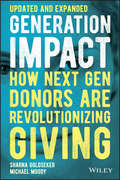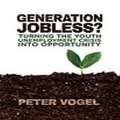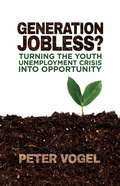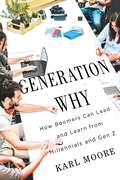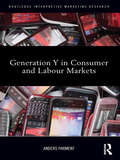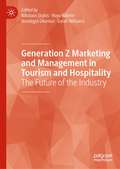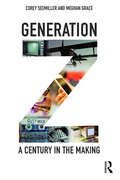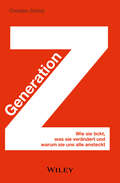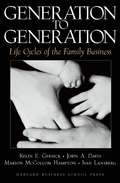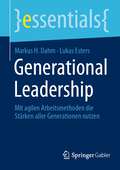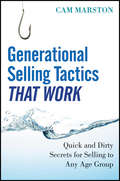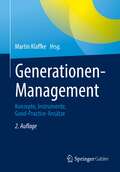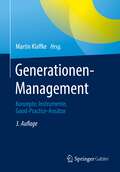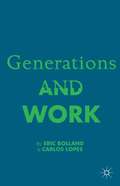- Table View
- List View
Generation Impact: How Next Gen Donors Are Revolutionizing Giving
by Sharna Goldseker Michael MoodyAn insider's guide to the coming philanthropic revolution Meet the next generation of big donors—the Gen X and Millennial philanthropists who will be the most significant donors ever and will shape our world in profound ways. Hear them describe their ambitious plans to revolutionize giving so it achieves greater impact. And learn how to help them succeed in a world that needs smart, effective donors now more than ever. As "next gen donors" step into their philanthropic roles, they have not only unprecedented financial resources, but also big ideas for how to wield their financial power. They want to disrupt the traditional world of charitable giving, and they want to do so now, not after they retire to a life of philanthropic leisure. Generation Impact: How Next Gen Donors Are Revolutionizing Giving pulls back the curtain on these rising next gen donors and the "Impact Revolution" they seek, offering extensive firsthand accounts and expert analysis of their hands-on, boundary-pushing strategies, as well as their determination to honor the legacies they've inherited and the values they hold. This Updated and Expanded edition includes new, practical resources designed to help those who work with next gen donors to engage with them in even more productive and effective ways – to help them become the sort of transformational donors we all need them to be in this pivotal time. Three Best Practice Guides offer targeted tips for key audiences – nonprofits and fundraisers, families, and advisors – and introduce new data and additional featured donors. A new Preface answers the most pressing questions asked by the thousands of readers already energized by Generation Impact, including what has changed in the world in recent years and how these influential emerging donors are responding. Adapting to the revolution that next gen donors are bringing may not be easy, but this book can help.
Generation Investment Management
by Vikram Gandhi Sarah MehtaIn January 2020, sustainable investment firm Generation Investment Management (Generation), was debating whether to terminate coverage of John Deere, one of its 47 portfolio companies. Generation believed that the type of mechanized agriculture enabled by John Deere's products was a vital tool for improving crop yield and farm productivity, and for feeding the world's growing population at scale. As time had passed, however, Generation's partners and analysts had grown increasingly concerned about the broader impacts of agriculture, which accounted for up to 90% of freshwater consumption and generated about 24% of greenhouse gas emissions worldwide. These concerns, coupled with emerging consumer trends that might reduce long-term demand for John Deere's products, had led Generation to consider removing the company from its focus list of potential portfolio companies.
Generation Jobless
by Peter VogelGeneration Jobless? uniquely explores the characteristics of both today's and tomorrow's youth and the causes of the youth unemployment crisis. The book takes a global, multi-stakeholder perspective to showcase proven solutions to tackle the crisis. Featuring interviews and input from business leaders, policy makers, educators, entrepreneurs and the Next Generation itself, it offers a positive and constructive look at change by directing each group to become part of the solution and in particular youth to take on responsibility for themselves and their peers by turning into job creators rather than job seekers. #generationjobless
Generation Jobless?: Turning the youth unemployment crisis into opportunity
by P. VogelOffering guidance on the opportunities and threats for future generations, and featuring interviews with business leaders, this book provides a constructive look at change. It directs the youth to become job creators, not job seekers, and to approach the corporate and political worlds with an entrepreneurial mind-set.
Generation NGO
by Apale, Alisha Nicole & Stam, ValerieYoung Canadians are increasingly active and engaged in global issues. Many are eagerly poised to contribute–in smaller and even larger ways–to international development and the Canadian national politics that, for better or worse, shape the field. Generation NGO captures some of the first impressions of these young international development professionals before they are relegated to the dusty corners of memory. It provides snapshots of some of their first experiences with inequality and poverty, power and privilege, stereotypes, identity, social location, prejudice, and injustice. It is as much about questions as it is about answers. These essays illustrate the continual negotiation of development workers in positioning and conducting themselves in a morally and ethically charged profession. A must-read collection for Canadians contemplating development work abroad, this collection will also provide food for thought for more seasoned veterans of NGO forays long after they have returned from the field.
Generation Rx: How Prescription Drugs Are Altering American Lives, Minds, and Bodies
by Greg CritserThis in-depth look at the rise of Big Pharma and pill marketing is &“a page-turner&” (Booklist, starred review). A finalist for a PEN America Literary Award for Research Nonfiction, this book takes a deep look at how the pharmaceutical industry—with some help from the medical and insurance fields and from American consumers themselves—has pushed its products, often at the expense of our health. Generation Rx reveals the roots of many of the widespread societal problems we face today, explaining how marketing efforts changed powerful chemical compounds for chronic diseases, once controlled by physicians, into substances we feel entitled to, whether we need them or not. Using exclusive interviews with the strategists, scientists, and current and former heads of GlaxoSmithKline, Eli Lilly, Merck, Roche, and more, the author of Fat Land presents a &“fascinating and disturbing&” story of business interests unleashed on an unsuspecting public, and a cultural shift that has caused lasting—and sometimes lethal—damage (New Scientist). &“What Fast Food Nation did for the way Americans eat, Greg Critser does for the way we medicate ourselves.&” —Michael Pollan, bestselling author of The Omnivore&’s Dilemma
Generation Why: How Boomers Can Lead and Learn from Millennials and Gen Z
by Karl MoorePerhaps more than ever before, young people entering the workforce are searching for meaning and authenticity in their careers. This book helps managers understand the postmodern worldview held by generation Z and younger millennials, how it influences their behaviour at work, and how they want to be led in the workplace.Karl Moore takes a practical and down-to-earth approach to understanding what drives millennials and generation Z and how the education system they were brought up in has informed their worldview. Based on hundreds of interviews conducted with under-thirty-year-olds across Canada, the United States, Japan, Iceland, the United Kingdom, and elsewhere, as well as interviews with executives to gain their perspectives on changing dynamics in the workplace, Generation Why provides a thorough study of these generations’ ideas about truth, hierarchy, and leadership.Focusing on listening, purpose, reverse mentoring, feedback, and how people relate to each other in the workplace, Generation Why provides the essential tools for effectively working with millennials and generation Z and unlocking their full professional potential.
Generation Y in Consumer and Labour Markets (Routledge Interpretive Marketing Research)
by Anders ParmentGeneration Y in Consumer and Labour Markets explores the role of people born in the late 1970s and 1980s as consumers and coworkers in an emerging post-modernist society. Having grown up in a branded society overcrowded with commercial messages and a never-ending supply of choices and opportunities, Generation Y not only influences consumption patterns, they also bring their values to work life, thus changing the attitudes towards the employee-employer relationship and how work is being done. Generation Y particularly see work as a venue of self-realization and the boundaries between work and leisure time are becoming blurred—thus the consumer and labor markets converge in some critical dimensions. This book delves into the substantial research body on characteristics and behaviors of the Generation Y, including their relation to other generations and the role of understanding generations in developing effective and attractive organizations. It further outlines the experiences and best practice for attracting, recruiting, selling to, and communicating with Generation Y, based on the author’s experiences from hundreds of organizations where he has been involved as a consultant – offering the reader a better understanding of generations in marketing research, and the impact of generations in employee-employer relations.
Generation Z Marketing and Management in Tourism and Hospitality: The Future of the Industry
by Sarah Williams Roya Rahimi Nikolaos Stylos Bendegul OkumusGeneration Z (Gen Z) is the demographic cohort also known as Post-Millennials, the iGeneration or the Homeland Generation. Referring to individuals born roughly between the mid-1990s and the early 2000s, they are our youngest consumers, students, colleagues, and voters. Understanding them is a key aspect. In the context of the hospitality and tourism, Gen Z-ers represent the future in human resources, and service production and consumption. This book focuses on the aspirations, expectations, preferences and behaviours related to individuals within this demographic. It critically discusses their dynamism in driving the tourism sector and offers insights into the roles that Gen Z will inhabit as visitors, guests, consumers, employees, and entrepreneurs. This book is a valuable resource for managers, scholars and students interested in acquiring concrete knowledge on how Gen Z will shape the marketing and management of tourism-related services.
Generation Z – Personalmanagement und Führung: 21 Tools für Entscheider (essentials)
by Lorenz Schlotter Philipp HubertPhilipp Hubert und Lorenz Schlotter geben Ihnen in diesem essential einen praxisorientierten und wissenschaftlich fundierten Einblick in modernes Personalmanagement und moderne Führung mit Fokus auf junge Fachkräfte und Experten der Generation Z (Jg. 1995-2010). Die Autoren nehmen Sie mit auf eine Reise durch 21 Tools, die Ihnen dabei helfen werden, die Generation Z noch effektiver zu finden, zu binden und zu führen. Dieses Buch ist Ihr praxisnaher Begleiter für die tägliche Arbeit mit der Generation Z.
Generation Z: A Century in the Making
by Corey Seemiller Meghan GraceNo other generation in history has received as much coverage as the Millennial generation. Books, Google searches, blogs, and news articles are everywhere about them. Yet, Generation Z is comprised of our youth and young adults today and has received very little attention comparatively. Those in Generation Z are among our youngest consumers, students, colleagues, constituents, voters, and neighbors. Being able to better understand who they are and how they see the world can be helpful in effectively working with, teaching, supervising, and leading them. Generation Z: A Century in the Making offers insight into nearly every aspect of the lives of those in Generation Z, including a focus on their career aspirations, religious beliefs and practices, entertainment and hobbies, social concerns, relationships with friends and family, health and wellness, money management, civic engagement, communication styles, political ideologies, technology use, and educational preferences. Drawing from an unprecedented number of studies with higher education research institutions, market research firms such as Pew and Census, other generational researchers and industry leaders, this is the authoritative defining work on Generation Z that market researchers, consumer behaviour specialists, and employers sorely need – and it is a fascinating read for anyone interested in the sociology of generations.
Generation Z: Wie sie tickt, was sie verändert und warum sie uns alle ansteckt (The\changing Context Of Managing People Ser.)
by Christian ScholzWie können Unternehmen und Gesellschaft mit der Generation Z umgehen, dieser Frage geht dieses Debattenbuch von Christian Scholz nach. Aber er stellt auch der Generation Z die Frage, wie sie mit ihrem Umfeld umgehen sollte. "Arbeitsscheu", "Kuschel-Kohorte", "verwöhnt oder verwirrt", "radikale Egoisten" ... Das alles sind Beschreibungen für eine neue Generation, die langsam und unaufhaltsam auf uns zurollt - die Generation Z. Und nicht nur das, geradezu zombieartig steckt diese Generation auch andere Generationen an. Da machen sich zwangsläufig Unsicherheit und ungute Gefühle unsere Zukunft betreffend breit. Die Generation Z, die bereits Schulen und Arbeitswelt erobert hat. Bei diesen ab Anfang 1990 Geborenen weicht das Wertemuster fundamental von den Einstellungen voriger Generationen ab. In seinem Buch beschreibt er gleichermaßen positive wie negative Effekte und will vor allem Wege zu einem gegenseitigen Verständnis aufzeigen. Der Leser taucht ein in die Lebenswelt der Generation Z, die aufgewachsen ist mit Massenentlassungen und Zeitarbeit einerseits und ungerecht hohen Vorstandsgehältern andererseits. Es erscheint nachvollziehbar, warum die nächste Generation eine emotionale Bindung an Unternehmen und Verantwortung ablehnt. Für die Generation Z ist Arbeit nur ein Mittel zum Zweck, reduziert auf den Zeitraum zwischen 9 und 17 Uhr. Beruf und Privatleben sind strikt getrennt. So sind die Digital Natives nach Feierabend für den Chef auf ihrem Smartphone nicht mehr erreichbar. Das Buch bietet aber mehr als die Beschreibung dieser "Next Generation". Christian Scholz regt auch zu einem generationenübergreifenden Dialog an: Andere Generationen können ihr Leben durch Übernahme einiger Gedanken der Generation Z bereichern und lebenswerter gestalten. Andererseits muss sich die Generation Z damit arrangieren, dass die volle Bandbreite ihrer Idealvorstellungen gesellschaftlich nicht tragbar ist. Damit erhöht sich die Chance auf ein künftig produktives Zusammenarbeiten und angenehmes Zusammenleben.
Generation and Gender in Academia
by Kate White Barbara BagilholeGeneration and Gender in Academia is the first cross-cultural analysis of the differences in career trajectories and experiences between a senior and younger group of women academics. This volume uses individual autobiographies of women academics in Australia, Ireland, New Zealand, Portugal, South Africa, Sweden, Turkey and the United Kingdom, who are members of the international feminist research consortium – the Women in Higher Education Management (WHEM) Network. Four major themes in their stories are national context; organisational context; family, class and location; and agency. While the younger generation believe they are entitled to careers on the same terms as their male colleagues, major challenges remain. These include countering the argument that the battles have been won for younger academics; lack of support and mentoring at the outset of careers; the continuing difficulty of aspiring to a traditional academic career; capacity for playing the 'game' in managerial universities; and recognising mobility as crucial to career success.
Generation to Generation
by John A. Davis Gersick Kelin E. Marion Mccollom Hampton Ivan Lansberg Kelin E. GersickGeneration to Generation presents one of the first comprehensive overviews of family business as a specific organizational form. Focusing on the inevitable maturing of families and their firms over time, the authors reveal the dynamics and challenges family businesses face as they move through their life cycles. The book asks questions, such as: what is the difference between an entrepreneurial start-up and a family business, and how does one become the other? How does the meaning of the business to the family change as adults and children age? How do families move through generational changes in leadership, from anticipation to transfer, and then separation and retirement? This book is divided into three sections that present a multidimensional model of a family business. The authors use the model to explore the various stages in the family business life span and extract generalizable lessons about how family businesses should be organized.
Generational Diversity at Work: New Research Perspectives
by Emma ParryOver the past decade much attention has been paid to the apparent differences in consumption preferences or workplace attitudes and behaviours across generations. Within Western economies such as the USA, UK and Australia, it is commonly assumed that that there are now four generations in the workplace, namely Veterans (born 1925-1942), Baby Boomers (1943-1960), Generation X (1961-1981) and Generation Y (1982- 2000) The concept of generational differences at work is one that has recently been adopted by practitioners as a basis on which to design human resource management and career management practices. However, there has been some concern in academic circles about the validity of the notion of generations and the evidence base that supports it. There is therefore a need for new perspectives and methodological approaches to investigating generational differences at work in order to establish the validity and value of generations as an axis of diversity. Generational Diversity at Work: New Research Perspectives will address this need by presenting and discussing research into generational diversity that adopts a range of new theoretical perspectives or methodological approaches. This book is designed as a first step in addressing the need to critically examine the theoretical and empirical basis for generational differences and to provide some new empirical data in this area.
Generational Leadership: Mit agilen Arbeitsmethoden die Stärken aller Generationen nutzen (essentials)
by Markus H. Dahm Lukas EstersUnsere Gesellschaft befindet sich in einem ständigen Wandel und das betrifft auch die Arbeitswelt. Wir erleben derzeit einen Generationswechsel, der sich auch auf die Zusammenarbeit der verschiedenen Generationen auswirkt. Die ältere Generation bevorzugt traditionelle Arbeitsmethoden, während die jüngere Generation eher auf moderne Technologien und agile Arbeitsmethoden setzt. Dies führt oft zu Konflikten in der Zusammenarbeit zwischen den verschiedenen Generationen. Doch wie können wir diesen Konflikten entgegenwirken und eine produktive Zusammenarbeit zwischen den Generationen ermöglichen? In diesem Buch beschäftigen wir uns mit dem Konzept des „Generational Leadership“ und zeigen auf, wie mit agilen Arbeitsmethoden die Stärken aller Generationen genutzt werden können.
Generational Policy
by Laurence J. KotlikoffKotlikoff discusses the incidence and measurement of generational policy, the relationship of generational policy to monetary policy, and the vacuity of deficits, taxes, and transfer payments as economic measures of fiscal policy.
Generational Selling Tactics that Work
by Cam MarstonMake the sale to four key generations All your customers like the same type of service, right? And all your products should be sold the same way to all prospects, right? And the reasons you like your product and service are the same reasons your buyers should like it, right? Wrong! What your sales team doesn't know about Gen Xers, Boomers, Matures, and Millennials impacts the bottom line. Each generation's differing values creates differing expectations for what makes a quality sales or service experience. In Generational Selling Tactics that Work: Quick and Dirty Secrets for Selling to Any Age Group, thought leader Cam Marston reveals the four generations' sales and services biases and provides simple, easy-to-execute ideas for reaching each. Author has a winning track record with his previous book, Motivating The "What's In It for Me?" Workforce Unique in preparing you and your sales team to sell cross generationally, not just to one generation or other Highly energetic and engaging to read, Generational Selling Tactics that Work is full of immediately actionable ideas for each generation so you can sell confidently and deliver superb service to each of these unique demographics.
Generationen (gut) führen: Altersgerechte Arbeitsgestaltung für alle Mitarbeitergenerationen
by Sabine Schröder-KunzDer demografische Wandel stellt nicht nur die Gesellschaft vor große Herausforderungen, sondern auch einzelne Unternehmen. Die Personalentwicklung zeigt, dass Belegschaften immer älter werden und immer weniger junge Talente nachrücken. Jede Generation bringt andere Vorstellungen vom und Anforderungen an das Arbeitsleben mit. Das führt dazu, dass Generationen in der Arbeitswelt zunehmend aufeinanderprallen. Die soziale Kompetenz von Führungskräften spielt daher eine immer größere Rolle. In diesem Buch über die generationenübergreifende Mitarbeiterführung erfahren Führungskräfte, welche Anpassungen an Prozesse, Arbeitsumgebungen und Geschäftsmodelle nötig sind, um den Mitarbeitern aller Altersgruppen gerecht zu werden und gleichzeitig ein erfolgreiches Unternehmen zu führen. Die Autorin beleuchtet zunächst die theoretischen Grundlagen, die man kennen muss, um besser mit dem demographischen Wandel in der Arbeitswelt umgehen zu können. Dabei stehen die folgenden Fragestellungen im Vordergrund: Was bedeutet es, in einer sich verändernden Arbeitswelt Mitarbeiter zu führen? Welche Auswirkungen haben globale Megatrends auf Mitarbeiter und Führungskräfte? Wie können Führungskräfte ihrer Verantwortung gegenüber sich selbst, aber auch gegenüber den Mitarbeitern gerecht werden? Vor dem Hintergrund ihrer wissenschaftlichen und praktischen Erfahrungen zeigt die Autorin schlüssig und leicht verständlich, dass die Lösung vor allem in den Kompetenzen der Führungskräfte liegt. Als Gesundheitsmanager, Coach und Motivator ihrer Mitarbeiter sollten sie mehrere Rollen gleichermaßen ausfüllen können, um ihr Unternehmen und die Mitarbeiter der verschiedenen Generationen erfolgreich zu führen.
Generationen-Management: Konzepte, Instrumente, Good-Practice-Ansätze
by Martin KlaffkeDer demografische Wandel führt nicht nur zu einem Rückgang der Erwerbsbevölkerung, sondern auch zu neuen Ansprüchen und Vorstellungen der Beschäftigten im Arbeitsleben. Dessen ungeachtet setzen Arbeitgeber ihre Prioritäten beim Demografie-Management noch überwiegend in den Bereichen Gesundheitsförderung und Nachwuchsgewinnung. Dies reicht jedoch nicht aus, um in digitalen Zeiten eine wettbewerbsfähige Belegschaft aufzubauen. Denn für die Zukunftsfähigkeit von Unternehmen kommt es neben der Arbeitsfähigkeit vor allem auf die Kooperationsbereitschaft und das Engagement der Mitarbeitenden jeden Alters an.Generationen-Management steigert die Arbeitgeberattraktivität und nutzt das Potenzial altersgemischter Belegschaften nachhaltig zum Vorteil von Beschäftigten und Unternehmen. Hierbei sind drei Handlungsfelder wesentlich: die organisationalen und arbeitspolitischen Rahmenbedingungen gestalten, die lebenslange Leistungsfähigkeit fördern und die intergenerative Wertschätzung und Zusammenarbeit stärken. Mit umfangreichen Praxis-Tipps zeigen Expertinnen und Experten auf, wie Arbeitgeber die Fähigkeit zum Management einer Mehr-Generationen-Belegschaft gezielt entwickeln und sich einen handfesten Wettbewerbsvorteil erarbeiten können
Generationen-Management: Konzepte, Instrumente, Good-Practice-Ansätze
by Martin KlaffkeDas Buch vermittelt Konzepte, Instrumente und Good Practices-Ansätze, die Orientierung bei der pragmatischen Umsetzung von Generationen-Management am Arbeitsplatz bieten. Expertinnen und Experten zeigen aus einer Vielzahl von (personalwirtschaftlichen) Perspektiven auf, wie Arbeitgeber die Fähigkeit zum Management einer Mehr-Generationen-Belegschaft gezielt entwickeln und sich dadurch einen handfesten Wettbewerbsvorteil erarbeiten können.Der demografische Wandel führt in den 2020er Jahren zu einem massiven Rückgang der Erwerbsbevölkerung, parallel kommt es zu neuen Ansprüchen und Vorstellungen der Beschäftigten im Arbeitsleben. Dessen ungeachtet setzen Arbeitgeber ihre Prioritäten beim Demografie-Management noch oftmals in den Bereichen Gesundheitsförderung und Nachwuchsgewinnung. Für die Zukunftsfähigkeit von Unternehmen kommt es neben der Arbeitsfähigkeit jedoch vor allem auf die Kooperationsbereitschaft und das Engagement der Mitarbeitenden jeden Alters an.Generationen-Management steigert die Arbeitgeberattraktivität und nutzt das Potenzial altersgemischter Belegschaften nachhaltig zum Vorteil von Beschäftigten und Unternehmen. Hierbei sind drei Handlungsfelder wesentlich: die organisationalen und arbeitspolitischen Rahmenbedingungen gestalten, die lebenslange Leistungsfähigkeit fördern und die intergenerative Wertschätzung und Zusammenarbeit stärken. Für die dritte Auflage wurden die Beiträge erneut überarbeitet und aktualisiert.
Generationenmanagement in Arzt- und Zahnarztpraxis: Von Jung bis Alt ein starkes Team
by Stephan F. Kock Isabell LütkehausNicht nur der demografische Wandel führt zu einer anderen Arbeits- und Praxiswelt, sondern auch die unterschiedlichen Wünsche, Erwartungen, Werte und Befürchtungen der unterschiedlichen Mitarbeitergenerationen - von der Generation Y bis zu den Babyboomern - in Arzt- und Zahnarztpraxen. Diesem Wandel und Wettbewerb um die besten Köpfe sind Praxisinhaber und -inhaberinnen aber auch Leitungskräfte in medizinischen Versorgungszentren ausgesetzt. Wo gestern noch aus dem Vollen geschöpft werden konnte, regiert heute der Fachkräftemangel, den es sowohl mitarbeiter- als auch teamorientiert zu managen gilt. Ziel dieses Ratgebers ist es, einen Beitrag zur Verbesserung des generationenübergreifenden Miteinanders in Arzt-, Zahnarztpraxen und Medizinischen Versorgungszentren zu leisten. Die Autoren beschreiben anhand eines durchgängigen Beispiels, welche Schwierigkeiten es in der Praxis zu bewältigen gilt und wie ein gutes und professionelles Miteinander gelingen kann, bei dem auf die unterschiedlichen Mitarbeiterbedürfnisse eingegangen wird. Hilfreiche Checklisten und Tipps für den Praxisalltag runden das Buch ab. So finden Praxisinhaber und –inhaberinnen Sicherheit für ihr tägliches Tun, gewinnen Zeit für das Wesentliche und werden „nebenbei“ zu attraktiven Arbeitgebern, denen in der Gesundheitsbranche die Zukunft gehört.
Generationenwechsel im Mittelstand: Wie Ihre Unternehmensnachfolge sicher scheitert ... und wie Sie es besser machen können (essentials)
by Sascha GendersDer Mittelstand als Rückgrat der deutschen Wirtschaft steht vor einer kaum beachteten Herausforderung: dem Generationenwechsel auf den Chefsesseln. Demographischer Wandel und Alterung der heutigen Unternehmergeneration erhöhen die Anzahl angebotener Unternehmensübergaben. Aufgrund einer nach wie vor immer weniger werdenden Anzahl an Existenzgründungen kann dieses Angebot mangels Nachfrage immer schwieriger gedeckt werden. Das Problem hierbei ist: Scheitert der Generationenwechsel, erodiert das Erfolgsmodell Mittelstand. Das Buch liefert allen Interessierten einen Einblick dahingehend, was ein Unternehmer selbst tun kann, damit seine eigene Betriebsübergabe erfolgreich (nicht) scheitert.
Generations And Work
by Eric Bolland Carlos LopesBased on an extensive national survey of workers and four separate industry-specific surveys, Generations and Work will examine and provide answers to the most common issues and problems of multi generational work by assessing differences and commonalities between and among generations.
